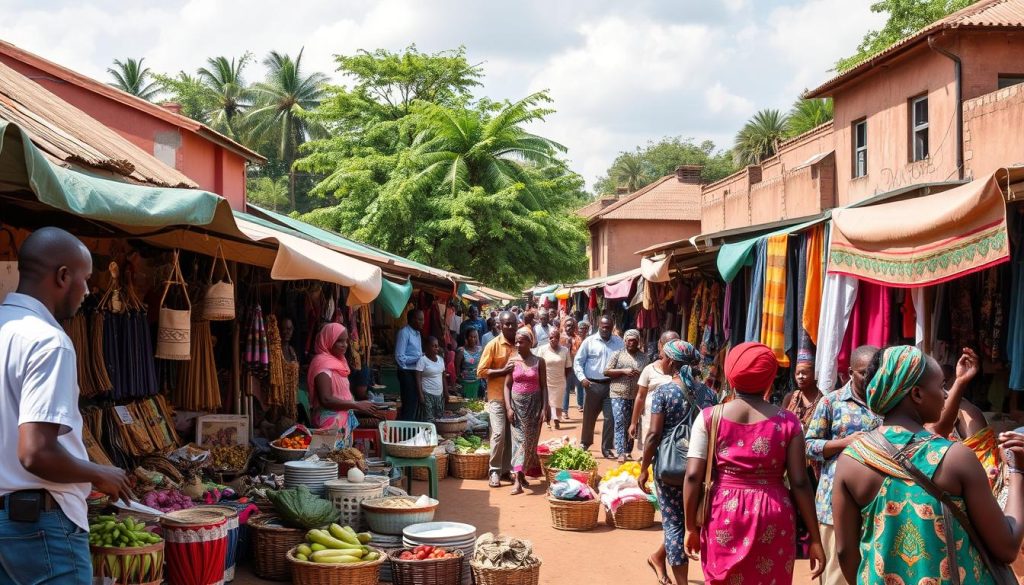Looking into successful business models in Africa is key to grasping the continent’s fast-changing economy. Africa’s rich diversity brings both challenges and chances for growth. By examining African business insights, we see how entrepreneurs tackle these hurdles to achieve lasting success.
This article will focus on notable case studies and new trends. These examples show the resilience and creativity of businesses across Africa.
Introduction to Business Models in Africa
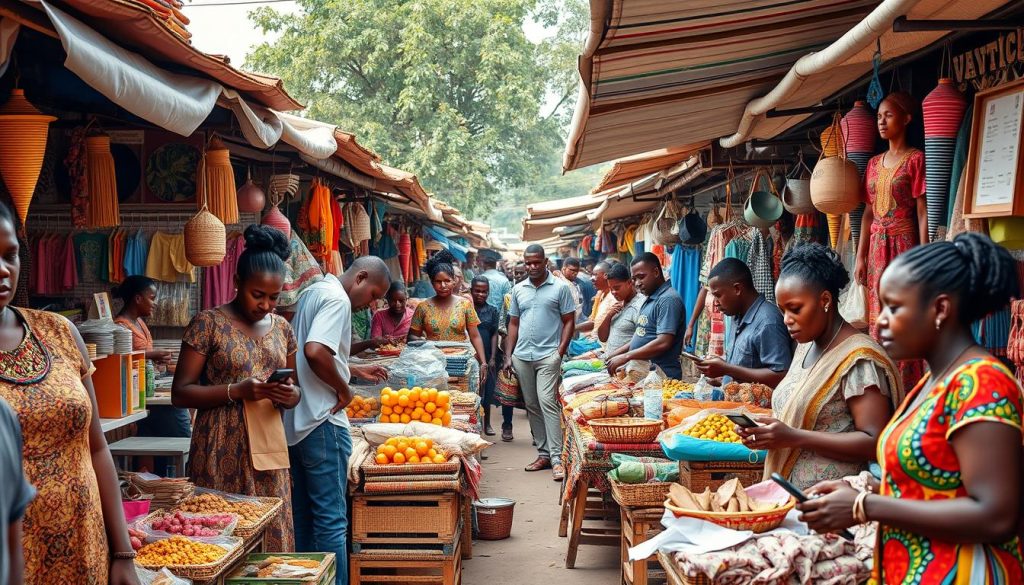
The business world in Africa is full of variety and new ideas. Entrepreneurs here are making their own ways, thanks to the local settings. It’s important to see how culture affects their choices and plans.
They know their communities well, which helps them create products that people want. This local knowledge is key to making things that really meet the market’s needs.
But, there are big challenges too. Things like economic ups and downs, social problems, and different political situations in different places. Yet, those who use local wisdom and creativity can adapt and succeed. Their ability to change shows the strength and originality of African business.
Understanding Africa’s Economic Landscape

Africa’s economy is a mix of diversity, showing the continent’s wealth, different cultures, and young people. Countries like Nigeria and Ethiopia are growing fast. This growth is driven by several key factors.
Natural resources like oil, minerals, and food are key to the economy. They help the GDP and attract foreign investors. This creates chances for the African market. The growing middle class is also changing how people buy things, leading to more demand.
The young population in Africa is driving innovation and starting new businesses. This pushes governments and companies to change and meet new market needs. Global trade also affects local economies, from prices to partnerships.
There are big differences in economic growth across Africa. Some places are doing well, while others are facing challenges. Looking at earnings, tech use, and infrastructure helps understand the market potential. As things change, Africa’s economy is set for more growth.
Successful Business Models in Africa

Africa’s economy is home to many successful business models. Companies like Jumia, Flutterwave, and the Dangote Group show how to succeed. They have found ways to overcome market challenges, showing what makes African businesses stand out.
These stories not only celebrate individual success but also shed light on what works in Africa. They offer insights into the key factors for success on the continent.
Case Studies of Prominent African Businesses
Jumia is known as the ‘Amazon of Africa’ for its e-commerce success. It has overcome big challenges by forming partnerships and investing in technology. This shows how important it is to understand local needs.
Flutterwave has changed the fintech scene in Africa with its payment solutions. It has made its services fit the different banking systems across the continent. The Dangote Group, meanwhile, focuses on agribusiness, using local resources to tackle food security issues.
Factors Contributing to Success
Innovation is key to success in Africa. It helps businesses find unique solutions to local problems. Knowing the market well allows companies to adapt and grow.
Strong leadership is also crucial. It sets a vision that motivates both employees and customers. This vision is the foundation for long-term success. By looking at these factors, we see that success in Africa comes from a mix of strategy and hard work.
Innovative Technology Solutions
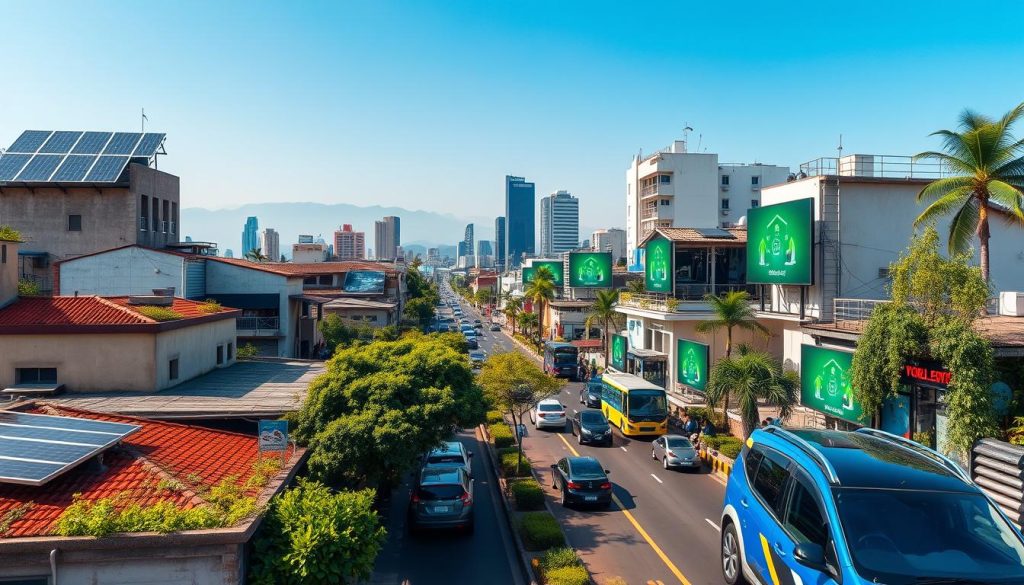
Innovative technology has changed Africa a lot. Mobile tech has made it easier for businesses to reach customers, especially in hard-to-reach places. This has improved communication and access to important services.
The fintech sector has grown a lot too. It shows how new solutions are changing how we handle money across the continent.
Impact of Mobile Technology
Mobile tech has had a big impact in Africa. It has helped businesses use platforms that reach many people. The main benefits are:
- It makes it easier to get to markets and services.
- It improves how businesses talk to customers.
- It makes paying for things easier with mobile banking.
This change has helped small businesses reach more customers. It’s a big deal for them.
The Rise of Fintech in Africa
Fintech has changed banking and finance in Africa. Companies like M-Pesa and Paystack show how tech is used to help millions. The key points are:
- More people can use financial services now.
- Transactions are easier, so you don’t need to go to the bank.
- New financial products are made for local needs.
This change is huge. It makes traditional businesses work harder to stay ahead.
Sustainability and Social Enterprises
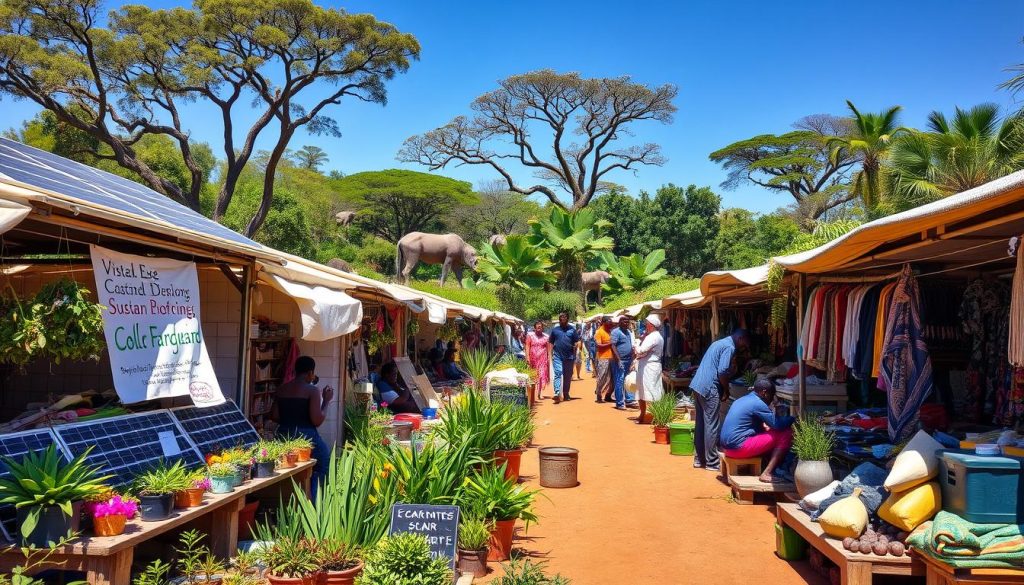
The trend of sustainability is growing fast in Africa. It shows a big commitment to doing business the right way. Companies now see that sustainable business in Africa is key for lasting success.
They are making their operations more environmentally and socially friendly. This approach can make them profitable and help the community too.
Leveraging Sustainability for Growth
Businesses that go green often do well financially and help society. For example, Tesla is leading the way with clean energy solutions. They show how important renewable energy is for jobs and power in Africa.
Companies that tackle waste also help the environment and gain customer trust. This shows how green business can be good for everyone.
Social Impact Ventures
Social enterprises in Africa are great at balancing making money and making a difference. They tackle big community problems and stay financially sound. By getting impact investment, they can grow and improve lives and economies.
This model shows how important it is to create social value and achieve business goals. It proves that working together can bring big benefits.
The Role of E-commerce in Business Growth
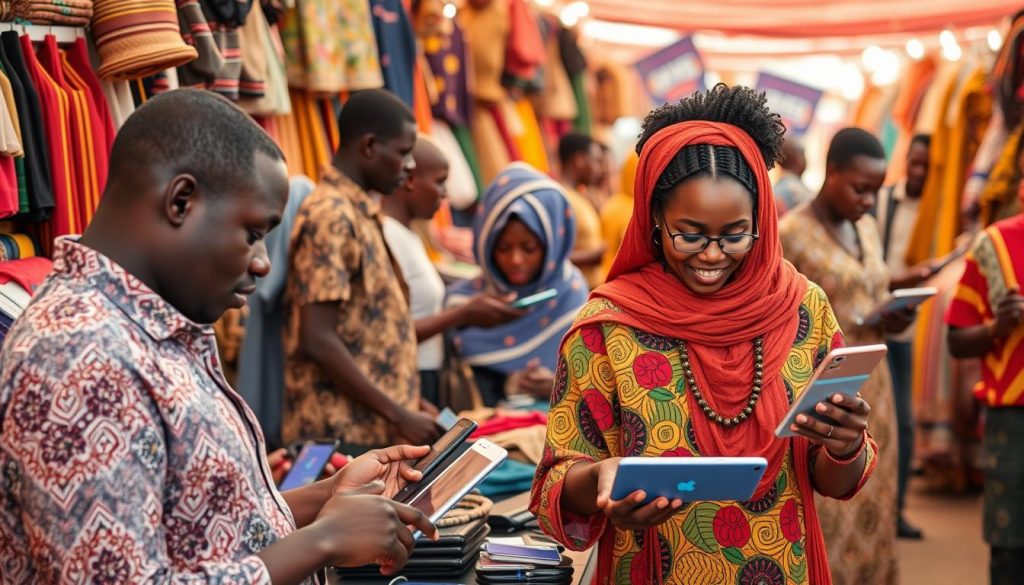
E-commerce in Africa is growing fast, thanks to the digital economy transformation during the pandemic. More people have internet access and better infrastructure. This makes it easier for online businesses to thrive.
Shopping online is now more popular than ever. This change has affected how people shop. Companies like Konga and Takealot are leading the way, offering a wide range of products and services.
Logistics and delivery are getting better to meet e-commerce needs. Companies are working hard to deliver goods quickly and efficiently. This is key to keeping e-commerce growing in Africa.
- Rise in internet usage enhancing consumer access
- Increasing variety of products available online
- Development of reliable payment systems
- Growth in mobile commerce as smartphones become ubiquitous
Investing in technology and teaming up with logistics providers is crucial for success. This approach helps businesses stay ahead in the online market. It shows how e-commerce is driving economic growth across Africa.
Investment Opportunities in African Markets
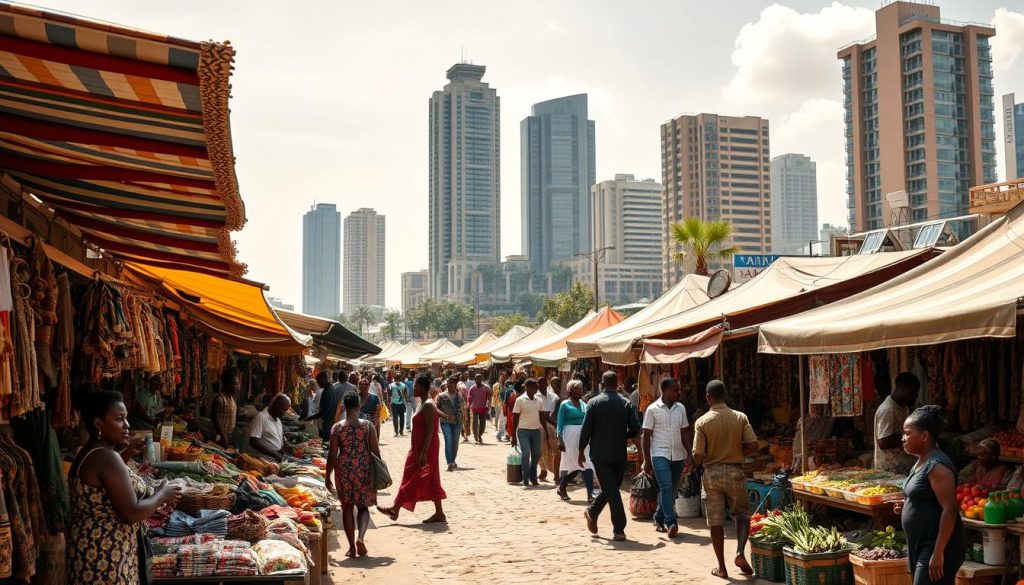
African markets are full of chances for investors. Both local and international investors are drawn to them. The trend in foreign direct investment in Africa is positive. Sectors like technology, agriculture, and renewable energy show the continent’s potential.
Attracting Foreign Investment
The economy of Africa is diverse and full of opportunities. Governments are making it easier for foreign investment. Investors are interested in:
- Technology: Digital solutions are being adopted quickly.
- Agriculture: New ways to farm are making things better.
- Renewable Energy: Africa’s natural resources are key for sustainable energy.
Venture Capital Trends in Africa
More venture capital firms are interested in Africa. This is because of:
- Growing entrepreneurial spirit: Young Africans are starting businesses.
- Increasing access to technology: Smartphones and the internet help businesses.
- Government support: Policies for startups and tech hubs are growing.
Challenges Facing Businesses in Africa
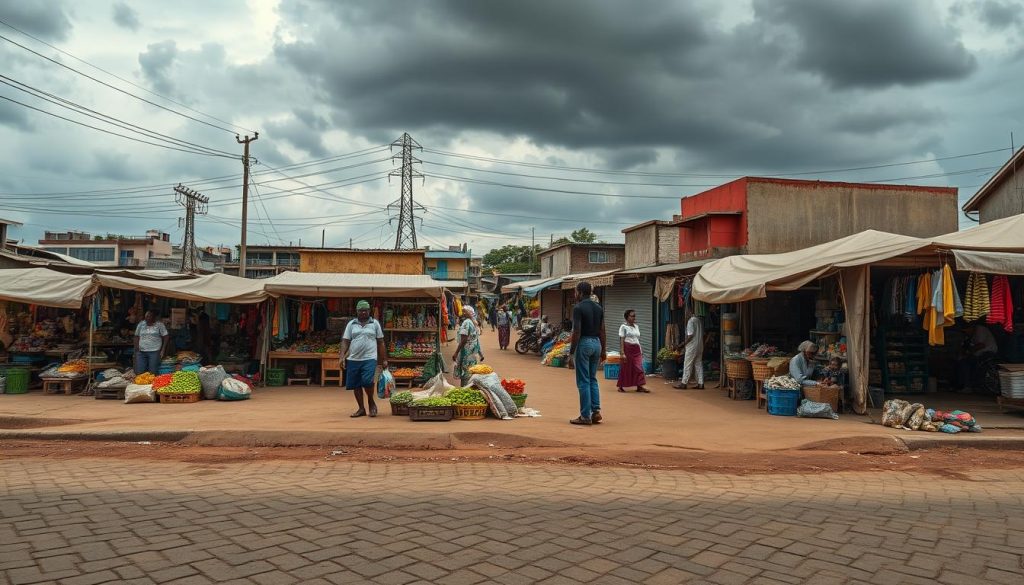
Businesses in Africa face many challenges that stop them from growing and making profits. A big problem is the lack of good infrastructure. This affects supply chains and makes operations less efficient. Many areas have poor transport and energy, which raises costs and limits chances.
Regulations are also a big issue. Laws are complex and not always followed the same way. This makes it hard for entrepreneurs to know what to do.
Corruption is another big problem. It messes up fair competition and stops new ideas. Businesses often have to deal with bribes and kickbacks to survive. This makes the challenges faced by African businesses even harder.
Getting money is a big problem too. Banks are not always willing to lend, especially to small businesses. This limits how much they can grow. So, many businesses look for other ways to get money or use informal solutions.
But, many entrepreneurs in Africa are very resilient and adaptable. They use technology, make partnerships, and help their communities. This helps them deal with some of the challenges they face. Creative solutions and local knowledge are key to overcoming these obstacles.
The Informal Economy: Untapped Potential

The informal economy in Africa is a big part of the continent’s economy. It creates jobs and boosts economic activity, even with challenges. It’s important to understand this sector to unlock its full potential and move towards formalised businesses.
Characteristics of the Informal Sector
The informal economy is made up of small businesses that don’t follow formal rules. It has:
- Little access to money, which limits growth.
- Flexibility to quickly meet market needs.
- Little government oversight, causing uncertainty.
- Creates many jobs in local economies.
Transitioning to Formal Business Structures
Switching to formal businesses brings many benefits, solving Africa’s informal sector problems. Advantages include:
- More chances to get funding from banks and investors.
- Wider market access for growth and stability.
- Legal protections for business security and trust.
- Eligibility for government support and grants.
Success stories show how businesses have made this change. It helps entrepreneurs and boosts the economy and stability.
Sector-Specific Business Models

In Africa, new business models are key to innovation and sustainability. In healthcare, telemedicine and mobile health are changing the game. Agribusiness is working to boost food security and adopt green practices. This section will look at these trends and highlight leading companies.
Healthcare Innovations
The healthcare sector in Africa is seeing a big change thanks to technology. Telemedicine lets patients get care from anywhere, making health services better and more accessible. This is a big step forward for health across the continent.
- Companies like mPharma are making medicines more affordable.
- Telehealth helps keep chronic conditions under control.
- Mobile health apps help with public health and tracking symptoms.
Agribusiness: Feeding the Future
Agribusiness in Africa is vital for food security. New methods are being used to make farming more productive and sustainable. Vertical farming and precision agriculture are changing how food is grown.
- Farmers are using smart farming to deal with weather changes.
- New tech in farming tools is making crops more efficient.
- Working together is helping share knowledge and resources.
Education and Knowledge-Based Businesses

The education business in Africa is changing fast, with new ideas coming up. The continent wants to use its people’s skills better. So, a strong education sector is key. Technology helps by offering different ways to learn, fitting the local workforce.
Online learning sites are becoming popular. They offer flexible learning that meets the needs of people all over Africa. These sites help learners gain skills needed for today’s jobs.
Startups focused on education are growing in Africa. They help people get better jobs by offering training. This helps the economy grow. It also brings new ideas and jobs to communities.
- Utilisation of mobile technology for education.
- Development of local content in various languages.
- Partnerships with international institutions to enhance curriculum quality.
As Africa moves towards a knowledge-based economy, tech and education will be key. They will shape the continent’s future. This will help everyone in education move forward.
Government Policies and Their Influence on Business

In Africa, government policies and business operations are closely linked. These policies shape the economic landscape. They set the rules for how businesses operate, affecting their growth and investment opportunities.
Recently, there have been efforts to make business regulations simpler. This aims to make it easier to do business in Africa.
Regulatory Frameworks
Good government policies can help entrepreneurs thrive. Countries like Rwanda have made it easier to start and grow businesses. They have tackled the challenges that often slow down progress.
- Streamlined registration processes have cut down the time to start a business.
- Tax breaks attract both local and foreign investors.
- Improved infrastructure, thanks to supportive policies, boosts business efficiency.
Looking at countries like Kenya shows how new policies can boost the economy. By constantly improving business rules, governments can help businesses succeed in the long run.
Networking and Collaboration in Business Growth

In Africa, networking is key for business growth. It helps entrepreneurs connect and share resources. This leads to partnerships that drive innovation and growth across sectors.
Business associations and incubators are crucial. They offer places for networking, mentorship, and guidance. These partnerships give businesses a competitive edge, helping them succeed in local and global markets.
Networking events are vital for entrepreneurs. They help build relationships and lead to collaborations. These can result in joint ventures or the sharing of best practices.
- Access to resources through partnerships
- Enhanced visibility for businesses
- Increased opportunities for funding and investment
- Support systems that promote growth
Collaboration in business fosters innovation. Networking boosts individual businesses and aids the continent’s economic growth. As entrepreneurs form partnerships, they help build a thriving ecosystem for sustainable development.
Future Trends in African Business Models
The future of business in Africa is set for big changes. New trends are changing the way things work. Digital technology is making businesses more efficient and easier to run.
Mobile platforms and online shopping are becoming more popular. This is because more people in Africa are using technology. It’s opening up new opportunities in areas like finance, health, and retail.
Businesses are also focusing more on being green. They’re adding sustainable practices to their work. This shows they care about the planet and want to make money at the same time.
People want to buy from companies that are good for the environment. This is part of the shift towards more sustainable business practices in Africa.
Changes in politics and the way people shop are also affecting businesses. They need to understand what their customers want. Knowing what the local market likes is key to success.
By embracing these changes, businesses can grow and do well. The future of business in Africa is full of chances for success.

